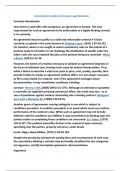Lecture notes
Contract Law-Certainty & Intention to Create Legal Relations(LLB, Exam Plans)
- Module
- Contract Law
- Institution
- University Of Oxford
Unlock your understanding of two foundational elements of contract law—Certainty and Intention to Create Legal Relations—with these meticulously curated and comprehensive notes. These notes offers an in-depth exploration of key principles, landmark cases, and academic opinions, ensuring you gra...
[Show more]



